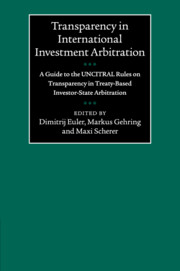 Transparency in International Investment Arbitration
Transparency in International Investment Arbitration Book contents
- Frontmatter
- Contents
- Contents
- List of contributors
- Foreword
- Acknowledgements
- Table of treaties, guidelines and rules
- Table of cases
- List of abbreviations
- 1 Introduction
- 2 Public interest in investment arbitration
- 3 Article 1. Scope of application
- 4 Article 2. Publication of information at the commencement of arbitral proceedings
- 5 Article 3. Publication of documents
- 6 Article 4. Submission by a third person
- 7 Article 5. Submission by a non-disputing Party to the treaty
- 8 Article 6. Hearings
- 9 Article 7. Exceptions to transparency
- 10 Article 8. Repository of published information
- 11 The application of transparency
- 12 Conclusion: The Rules as a swing of the pendulum?
- Index
8 - Article 6. Hearings
Published online by Cambridge University Press: 05 August 2015
- Frontmatter
- Contents
- Contents
- List of contributors
- Foreword
- Acknowledgements
- Table of treaties, guidelines and rules
- Table of cases
- List of abbreviations
- 1 Introduction
- 2 Public interest in investment arbitration
- 3 Article 1. Scope of application
- 4 Article 2. Publication of information at the commencement of arbitral proceedings
- 5 Article 3. Publication of documents
- 6 Article 4. Submission by a third person
- 7 Article 5. Submission by a non-disputing Party to the treaty
- 8 Article 6. Hearings
- 9 Article 7. Exceptions to transparency
- 10 Article 8. Repository of published information
- 11 The application of transparency
- 12 Conclusion: The Rules as a swing of the pendulum?
- Index
Summary
8.1 Introduction
1. In July 2013, the United Nations Commission on International Trade Law (UNCITRAL) adopted a new set of rules aimed at promoting greater openness and transparency of the arbitral process in investor-State arbitration (the Rules). The Rules represent a shift away from secrecy and confidentiality towards greater openness in treaty-based investor-State arbitrations. Increased transparency has become the ‘new normal’ in international investment arbitration as more investor-State disputes involve challenges to generally applicable regulatory measures – environmental laws, human rights and public health measures – enacted by host State governments. Resolution of cases involving these issues can impact investor interests, the public interest and the regulatory powers of the State. The Rules establish a process and an institutional framework to ensure that transparency is clearly and consistently applied in arbitration.
2. Article 6 of the Rules provides for public access to hearings in investor-State arbitration, subject to certain exceptions. Under the previous Arbitration Rules (1976), hearings were kept confidential unless the parties agreed to waive confidentiality, even where important public policies were at issue. Article 6 alters the landscape of dispute resolution under bilateral investment treaties (BITs) and other multilateral treaties by making the arbitration process more open to public participation and scrutiny. Article 6 applies to all disputes under UNCITRAL as the default rule; however, the previous standard of closed hearings applies to disputes fully within treaties concluded before 1 April 2014.
3. This chapter discusses the implications of open hearings under the Rules and examines some of the benefits and concerns of conducting arbitral hearings in this manner. Investors, States and the general public need to better understand how the idea of ‘open hearings’ will affect their interests and the decision to arbitrate claims under these rules in future investor-State disputes.
8.2 Background and purpose
4. International investment law has neither a centralised legal framework nor a hierarchy of rules to govern investor-State relations. In the absence of a single set of rules or standards for investment disputes, it is difficult to develop a consistent set of transparency norms for this area of dispute resolution.
- Type
- Chapter
- Information
- Transparency in International Investment ArbitrationA Guide to the UNCITRAL Rules on Transparency in Treaty-Based Investor-State Arbitration, pp. 227 - 248Publisher: Cambridge University PressPrint publication year: 2015


